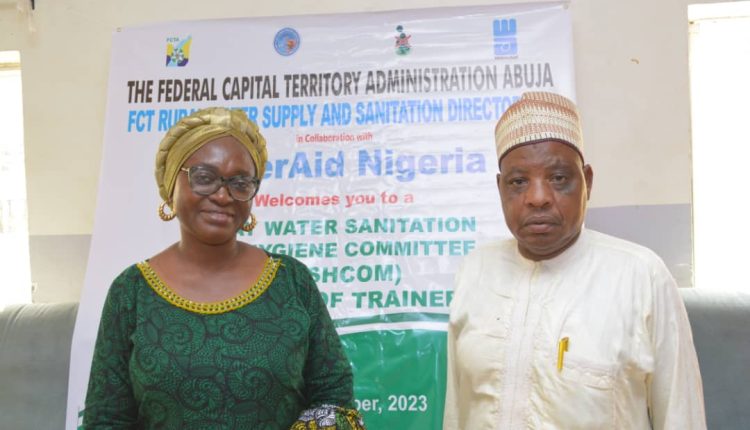
Mrs Aisha Bakpet, Head of Sanitation Department, FCT RUWASA, (L) and Alhaji Hussaini Abdulkadir, Head of Department, Community Mobilisation and Hygiene Promotion, RUWASA at a workshop to build the capacity of 27 master trainers on the expanded guidelines for Water Sanitation and Hygiene Committee (WASHCOM) in the Bwari Area Council of FCT.
The Rural Water Supply and Sanitation Agency (RUWASA) in conjunction with WaterAid Nigeria, on Tuesday underscored the importance of ensuring community participation and involvement in administering water sanitation and hygiene in Bwari Area Council communities in the FCT.

Dr Mohammed Hassan, the Executive Director of RUWASA undersored the importance of communities’ involvement in ensuring water sanitation and hygiene when he spoke at a five-day workshop organised by the agency in partnership with WaterAid, an NGO to build the capacity of 27 master trainers on the expanded guidelines for Water Sanitation and Hygiene Committee (WASHCOM) in the Bwari Area Council of FCT.
The News Agency of Nigeria (NAN) reports that the 27 participants in the workshop which began on Tuesday, are drawn from the various water Sanitation and hygiene units, RUWASA, Civil Society Organisations, and the WASH media which is expected to project the activities of the committee
Speaking on behalf of the executive director, Alhaji Hussaini Abdulkadir, Head of Department, Community Mobilisation and Hygiene Promotion, FCT Ruwasa, said that the train-the- trainers workshop was critical to wash activities.
“If you give an intervention in a community and there is no one to own it and take responsibility for its management, there will be no sustainability.
“For example, a borehole and toilet that may have been erected after triggering a community before you know it, may be vandalised in no time due to lack of adequate care,” he said.
According to him, the trainees serve as caretaker committee members that will ensure ownership and sustainability of interventions.
“Those people who will train WASHCOM are being trained today by facilitators so that they can step down the training when they go back to their area councils,” he added
Aisha Bakpet, Head of Sanitation Department, FCT RUWASA, said that the organisation of the training which is supported by WaterAid “is apt and targeted at the community level.
“They have been supporting us on these series of trainings for Bwari Area Council since January.
“For today, the 5-day training is the WASHCOM training, a train-the-trainers workshop that will integrate all aspects of WASHCOM in one training.
“The participants will go down to the communities and train the WASHCOM members to sustain their activities
“It is integrated. They need to start up a system to start owning what belongs to them and begin to seek support for their health services and water and hygiene services themselves by themselves,” she added.
Nanbam Michael, Programms Manager, WaterAid Nigeria said the NGO was desirous of strengthening communities in Bwari Area Council to ensure “they have committees that see to sustained functional water sanitation management at the community level.
“In Nigeria generally, maintenance and sustainability is a huge problem. You see a water source facility in a community with just a minor problem and you see people busy buying water.
“Residents of various communities could have functional water supply systems, yet they suffer lack of water and develop water-related diseases and issues because no one is entrusted with the responsibility of handling such repairs which usually only require very little funds to fix.
“If there is clean water and people are taking care of the facilities that supply the clean water, there will be no outbreak of diseases. And issues around water hygiene and sanitation will be at the barest minimum.
“We are here to support the government to ensure that facilities are functional and issues around sanitation and hygiene are handled in such a way that will ensure that everybody has clean water by the year 2030,” she added.
(NAN)


